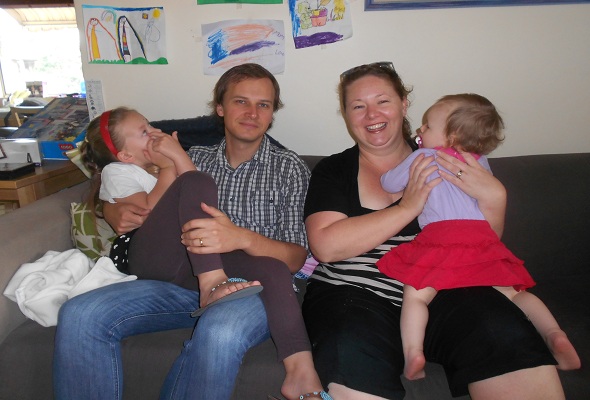
Paying for kindy costs Queensland’s chance to catch up
The Queensland government has been struggling to catch up with other high-achieving states; the introduction of prep, the entrance age for year 1 being raised by six months, and year 7 being introduced into high school are all part of the education reform to cater for this goal. However, Queensland Teachers Union Vice President Julie Brown says that it doesn't matter what high school moves are being made, for as long Queenslander's pay for kindergarten - we will always be behind.

Jon and Tara Henzell with daughters Meggy and Mae are concerned about the rising cost of kindergarten.
Despite the education reform introducing prep as the first year of school and moving year seven to become the first year of high school, when it comes to kindergarten, Queensland will always be trying to catch up.
“This move for year sevens into high school will certainly help [Queensland get in line], as it means students will get an extra year of a specialised science teacher in secondary for instance,” Julie Brown Queensland Teachers’ Union Vice President said.
“It is a historical fact that Queensland hasn’t provided free kindergarten as they do in Tasmania and Western Australia… and let’s face it, you have to look at where you start, and if you start behind the other states then it’s very hard to catch up.”
These comments are fresh on the positive results coming from the trial schools piloting year seven ahead of the state-wide move in 2015.
Ms Brown speaks highly of Murrumba State Secondary College that opened their enrolment for year seven and eight students this year and have so far delivered promising results – but promising results needs to happen for those aged three, not 13.
“Very few people outside of the education department understand that our kids in Queensland don’t attend kindergarten [the year before prep] in the high concentrations that they do in other states,” she said.
“When they did a survey three years ago, only 29 per cent of Queensland kids attended a proper early education program before they went to prep.
“New South Wales had 81 per cent attendance and Victoria had 96 per cent attendance … Queensland has the lowest rates in Australia.”
Ms Brown refers to the National Partnership Agreement on Early Childhood Education annual progress report that released kindergarten and pre-prep attendance figures across Australia.
Under the Agreement, the Commonwealth and state and territory governments have committed to ensuring that all children have access to a quality early education program by mid 2013.
Even though Queensland has received over $250 million dollars in funding in the last five years, and has begun to roll out 240 extra kindergarten services across the state, cost of kindy will always be a barrier.
“Pre-prep programs are free everywhere else in Australia … the crèche and kindergarten (C&K) in Queensland is wonderful but it’s not free, and we know kindy has good effects – it teaches social skills, motor skills, learning skills,” Ms Brown said.
When addressing affordability concerns from parents and C&K-affiliated centres, Cameron Dick Former Education Minister told The Courier-Mail in 2011 the Government had “championed the issue of early childhood education and care affordability at a national level”.
He said the Government directed higher levels of funding to services operating in disadvantaged or remote areas and provided a fee-relief subsidy for families who held a Health Care Card.
“We also are investigating options to further support Queensland families,” he said.
Tara Henzell, a Taringa mum, had to drop back to part-time study as the cost of care for her two daughters was too much for her and husband Jon.
“C&K pre-Prep and kindy programs for children are expensive, and for my daughter Meggy, per term we were paying $900 – it’s exorbitant,” she said.
“They’re [government] encouraging parents to put their children in an early childhood program but it’s not affordable…and there’s not always supplement or funding available.”
